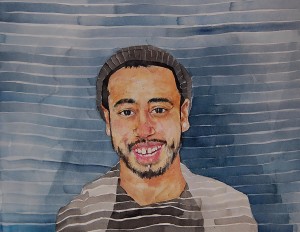 “I came into feminism as a butch Latina lesbian at a women’s college. Today I stand as a brown queer trans masculine person who moves through the world read as a cis brown man. I have often felt like my place in feminism has not always been welcomed, thought it has always been an integral part of my identity.
“I came into feminism as a butch Latina lesbian at a women’s college. Today I stand as a brown queer trans masculine person who moves through the world read as a cis brown man. I have often felt like my place in feminism has not always been welcomed, thought it has always been an integral part of my identity.
I came into my feminism hearing brown queer woman tell stories of their struggles for respect and recognition from men, from white folks and from the institutions they had to navigate daily. I come from a community where people steel stories from their hips.
I have learned along my path that we hold stories in our bodies. People think they can read my experience, who I am and where I am from. What my politics are. I often feel those stories are hidden in my body. Along with the struggles, trauma and resilience of my ancestors. My path to liberation must include telling these stories, working through trauma and confronting internalized oppression.
For the longest time I retreated to my masculinity, the misogyny I learned to “protect it” and the inherit homophobia that came with it. For fear of violence done unto my body because it was different. I would perpetuate the patriarchy, particularly around other men or masculine folks of color for fear of being seen as inauthentic. Convinced that if another brown man saw me with my masculine partner would confront me for being gay, find out I was trans and assault me. I grew up with the victim blaming narrative around rape culture and the fear of violence was my rationalization for perpetuating these systems of oppression.
How does one confront these issues? How does one shift to become an ally to the communities to which their non-complaisance becomes oppressive? These were questions that I struggled with constantly. Playing out my internalized sexism on people that I cared about all for the sake of being “man enough.” It was always important for me to “remember where I came from” but was still struggling to tell the stories of my “old self” and feel comfortable in the body I was given.
But it wasn’t until I participated in the Brown Boi Project that I was able to start having these conversations with myself. The Brown Boi Project is a leadership development and organizing project working to build the leadership, economic self sufficiency, and health of young masculine of center womyn, trans men, and straight men of color–pipelining them into the social justice movement. It was then for the first time I had met other masculine folks of color talking about these issues, wanting to breakdown oppressive masculinity and redefining it to be inclusive and affirmative of feminine identified folks. It wasn’t until then I was able to have conversations with people who looked like me to hold me accountable, to be able to better hear my partner’s concerns as a femme identified person, to be able to be critical of my own internalized sexism. It became apparent that my responsibility as a masculine person is to dismantle sexism and patriarchy and that it’s not the job of women and feminine identified folks.”
Read more of Qui’s article on race and community accountability.